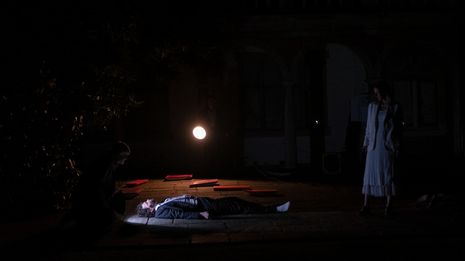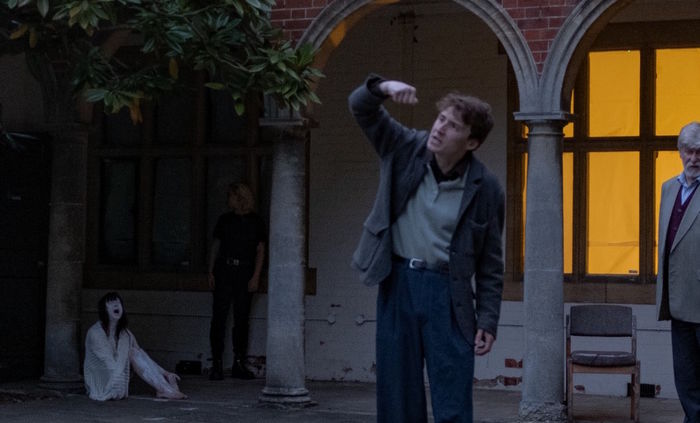Agamemnon has the gods on its side
Elegant and original, this production is a masterclass in haunting theatre-making

Leckhampton House must be one of Cambridge’s best-kept secrets. The site of a renowned 1895 seance wherein Cambridge researchers tried to find out whether the paranormal did indeed exist, Leckhampton’s grounds are playing host once again to ghosts and psychics in Mia Hull’s production of Agamemnon.
Snide comments abound about modern takes on ancient plays, but I’ve never understood why. To experience ancient Greek theatre as the original theatre-goers would have is a precious thing: to be able to read and understand the text’s social cues, humour and visual information with the fluency that they would have had. The production team gives us an opportunity to do just this. The preppy, monochrome 1970s costuming and deliveries that range from dryly humorous and darkly significant give us rich visual and cultural context that plays perfectly off of the late Victorian architecture (designed by a Cambridge classics scholar), with its elegant arches and columns. It’s all absurdly perfect.
“The warmth and light of the day faded away in perfect sync with the gradual darkening of the onstage action”
The enslaved Trojan prophet Kassandra’s screams echo faintly off of the buildings, what sounded like (endangered!) turtle dove song drifted from the trees, and the warmth and light of the day faded away in perfect sync with the gradual darkening of the onstage action. Cast members adjust the lighting of the set throughout, beginning with two small floor lights, and ending with powerful hand-held bulbs that swing wildly across the gardens and leave the nebulously grey Klytaimnestra (Zoe Bond) in sinister half-shadows. Siew Yen Loke’s ghost child, brings a fantastically creepy well of quiet and stillness to the stage by lurking silently in the growing periphery. It seems a pity she was limited to only two significant moments in the play, one of which rather bafflingly involved untying Agamemnon’s shoes, but nevertheless her presence was very striking.
In the first half of the production, all of my notes concerned the remarkable patience it exhibits. Just like Klytaimnestra’s dignified and self-assured movements as she walks slowly and proudly through her palace, the cast moves sure-footedly through the action. They wander easily around the performance space, alternating between a wonderfully sharp geometry and a looser individual approach to taking up space. They bring a poised symmetry to their environment with measured pacing and beautifully muted delivery — though it must be said that in a few moments both Agamemnon and Aegisthus went for a tone that was supposed to be threateningly quiet but unfortunately ended up as inaudible.
“The cast bring a poised symmetry to their environment with measured pacing and beautifully muted delivery”
Perhaps you can feel the but coming. If you close your eyes and plug your ears for about fifteen seconds in the middle, you’ll come back to a play just as subtle as the one you left. If you keep them open however — that’s when the play seems to lose patience with itself. What has been a restrained performance suddenly indulges itself in distressingly incongruous electric guitar, red lights, and totally unreadable physical theatre. It attempts to replicate the moment that the play, as Anne Carson (the playwright whose adaptation this production uses) writes, “explodes into symbolism” but ultimately completely fails to find the same sophisticated polysemy that Aeschylus does. This moment is supposed to take inspiration from Pina Bausch, but misses the intentionality one sees in her work, instead spiralling into a scattered and incohesive mess of unconveyed meaning. It seems wrong to suggest that the production lets itself down for such a short interlude, and ultimately I think it’s something that is relatively easy to swallow for the sake of the rest of the play, which is so wonderful.
Thankfully, after this it snaps instantaneously back into the clean, mature production I had been so enjoying beforehand. After such a dramatic modulation in energy levels, however, it does seem to self-consciously drag a little — but not enough to detract from Sylvie Field’s stellar performance as Kassandra, whose incredible voice trembles with clairvoyance through Anne Carson’s chillingly visceral rendering of Aeschylus’s two-millennia-old prophecies.
Honestly though, even those teeth-grindingly unfortunate fifteen seconds can’t spoil how overwhelmingly gorgeous this production is. Indeed, it is also overwhelmingly Cambridge. Sitting among a small group of strangers to watch actors of all ages masterfully reinterpret a play that is more than two millennia old, admiring the graceful arches of the architecture and walking back to my bike through a dimly-lit woods in which spring wildflowers were showing their valiant last, I got the sense of having experienced something that may well be unique to this exact place and time. This cast have captured a perfect balance, when balmy nights become bitter just as seamlessly as peaceful houses can become nightmares of violence and revenge.
Agamemnon is playing at Leckhampton House from Thursday 18th to Saturday 20th May, 8:30pm
 News / University Council rescinds University Centre membership20 February 2026
News / University Council rescinds University Centre membership20 February 2026 News / Hundreds of Cambridge academics demand vote on fate of vet course20 February 2026
News / Hundreds of Cambridge academics demand vote on fate of vet course20 February 2026 News / Judge Business School advisor resigns over Epstein and Andrew links18 February 2026
News / Judge Business School advisor resigns over Epstein and Andrew links18 February 2026 News / Union cancels event with Sri Lankan politician after Tamil societies express ‘profound outrage’20 February 2026
News / Union cancels event with Sri Lankan politician after Tamil societies express ‘profound outrage’20 February 2026 News / Caius students fail to pass Pride flag proposal20 February 2026
News / Caius students fail to pass Pride flag proposal20 February 2026










